- Home
- Gerald Hammond
A Shocking Affair Page 7
A Shocking Affair Read online
Page 7
When I came downstairs, it was clear that the staff had also been struck by the need to dignify the occasion with a change of clothes. I saw Joanna in a grey dress although with coloured stripes while Mary Fiddler, red of eye, had changed into a black dress which might have been more suitable for a cocktail party. She had even managed to find an apron of more muted tones.
They were bringing a late lunch on two trays into the sitting room. ‘My suggestion,’ Enterkin said apologetically when we were alone together. ‘But we could hardly demand a cooked meal in a house of bereavement. And there is much to be done. Sir Peter’s own doctor is on holiday in Florida at the moment. His partner, who attended the scene and who knows little of Sir Peter’s medical history, has certified death but is unable to certify the cause of it. But that is of little moment since I was considering whether to suggest that the estate should order a post mortem examination. You would agree to that?’
‘I think it’s a good idea – in case of future questions, as you said.’
‘Good. We might engage the services of Professor Mannatoy, the Professor of Clinical Pathology. One of the foremost men in the field. At the same time, we must have proof of death. And a notice in the press. And people to be informed.’ He sighed and began to jot down a list. ‘There is much to be done.’
I nodded agreement. ‘Did Peter not have a secretary?’ I asked. ‘It would seem to be usual.’
‘He had an excellent secretary until about a year ago when the young woman married and moved abroad. Her successor proved to be a disaster and he found that by making full use of modern technology he could manage perfectly well without anyone. Anything of great importance he brought to my office.’
‘If you tackle that list,’ I said, ‘I could go back to the study and start cancelling his appointments and notifying his business contacts.’
He agreed immediately, with the proviso that I limit myself strictly to business contacts, consulting him if in doubt. ‘And leave Weimms and Spigatt entirely to me,’ he added.
At first glance, Peter had kept several days more or less clear, presumably for the benefit of myself and Spin. Thereafter his business diary was fairly full for the next fortnight and then progressively less so, but on further study I saw that several of the appointments were with Mr Enterkin, presumably to meet with other parties, and it seemed hardly necessary to include him among the persons to be notified. Fortunately, Peter’s entries were not in the sort of personal shorthand adopted by lazier folk like me, and reference to his address book soon identified the individuals and businesses. In a long spell on the phone I left one message on an answering machine but managed to notify all the others and to make brief answers to a number of shocked enquiries. More than once, I found myself speaking to former acquaintances, now risen high in the world of finance.
The computer on Peter’s desk was not familiar to me but it turned out that the word-processor program was an updated version of the one used by Isobel. After a little fumbling and several false starts I managed to produce a set of draft letters confirming the sad news and either outlining or seeking proposals for future action. These I took, with my list, through to Enterkin. He agreed them with only two minor suggestions.
He nodded to a chair and I seated myself. For a modest man of unimpressive appearance he had a compelling manner. ‘Matters are taking their course,’ he said. ‘The doctor had a word with the fiscal, who has ordered an autopsy, thus saving the estate the cost. I have had a word with the Professor, however, and he promises to conduct it himself.
‘I shall have to leave shortly. Important though these matters are, I do have other clients. In an emergency I can be reached through my office or, later, at home. We will resume in the morning. In the meantime, I must leave you to hold the fort.’
One question had been niggling at the back of my mind. ‘Should I remove to the hotel?’ I asked him.
His sparse eyebrows, almost as bald as his head, shot up again. ‘I fail to see why you should. The house is here. The staff must be paid. The additional expense of keeping you here will be little more than the cost of raw food and laundry. Why burden the estate with unnecessary hotel bills? Besides, there may be occasional phone calls to be dealt with. I will explain the position to Mary Fiddler as I leave. I’ll have these letters re-typed – they would be better ostensibly coming from my office.’
‘Would it help if I gave you the disc I stored them on?’ I asked. ‘Then all your typist would have to do would be to change a few words and print them again on your letterhead.’
He seemed amused. ‘Thank you for the kind thought, but we have only just arrived in the age of the electric typewriter. I would invite you to dinner this evening but my wife might be discommoded by the short notice. Perhaps tomorrow, or some time next week? Meantime, you may care to while away the evening with a perusal of the will. Sir Peter’s copy of it must be around the place somewhere.’
He spent some little time in conclave with the staff and then drove very slowly down the long drive. As a consequence he was barely out of sight before it became clear that his forecast of ‘a few phone calls’ was a gross underestimate. His other prophecy, that word of Peter’s death would spread rapidly, was more accurate. There began a succession of phone calls, from desolated friends, anxious tenants and business contacts, concerned acquaintances and some which I could only assume were from the just plain inquisitive. I could do little more than list most of them for sifting and dealing with later. The local paper phoned and I fobbed them off with the briefest of statements and promised them a notice and an obituary in due course.
The telephone messages were nearing a climax when I was distracted by the arrival of a car and a ring at the bell. I was surprised to see a cup of cold tea and a biscuit at my elbow. I had not glimpsed the visitors but Joanna tapped at the door and told me that Keith Calder and Ian Fellowes hoped to see me. I kept them waiting for a minute while I put a suitably subdued and mildly discouraging message on Peter’s answering machine.
Joanna removed the teacup and gave me a reproachful glance before going to fetch the visitors. It was a measure of their respect for Sir Peter that each had found time to put on a black tie. They shook hands formally but with an air of doubt which I put down to uncertainty at what to say. Commiserations were hardly appropriate, when they had known the deceased, if not longer, far more continuously than I had. Instead we all agreed what a sad occasion it was. I decided to break the ice. The afternoon was almost gone. ‘As co-executor,’ I said, ‘I feel entitled to offer Sir Peter’s refreshments.’
They brightened. ‘Why not?’ Calder said. ‘Peter aye kept his cupboard well stocked with the best. We wouldn’t want it to fall into the hands of that apology for a man that his granddaughter’s walking out with, would we?’
‘Certainly not. Unless you’re on duty?’ I added to Inspector Fellowes.
He smiled sadly. ‘If I am,’ he said, ‘I may be forgiven. Tradition requires a stirrup cup for the deceased.’
Joanna had been waiting for just such instructions. I asked her to fetch whisky and a jug of water. Calder and Fellowes murmured a few affectionate words about Peter Hay. They were stilted words but I felt that they were more sincere than any eulogy.
When we were settled with our drinks, Calder said, ‘How did it happen?’
‘I didn’t see it.’ They listened intently while I told the story. The account seemed bare so I went on to quote what Mr Enterkin had said about it. ‘But you must know all this,’ I said to Fellowes. ‘An unexplained death would have been reported to you.’
‘Reported, yes,’ he said. ‘There’s no substitute to hearing it from the best witness. There’s been no further word about the dog?’
‘None that reached me.’
‘We’ll see what we can do about that.’
‘I think Ralph was wrong about Peter’s colour,’ Calder said. ‘I was with them both when Peter had an attack – the second or third, I forget which. His face didn’t change co
lour. Ralph’s remembering the faint that Peter threw, a couple of months after he came out of hospital from the first one. Lack of blood to the brain or something. So it could perfectly well have been another heart attack. I don’t know anyone who has survived five.’
‘I was wondering whether the electric fence was to blame,’ I said.
‘And so was I,’ said Fellowes.
Calder was shaking his head. ‘Electric fences are intended to turn cattle back, not kill them. A twelve-volt battery is usually enough power source but the current then goes through a transformer which steps it up to short pulses of a very high voltage. That fence comes off the mains through a transformer. I don’t know what voltage it can reach but –’
‘But we can find out,’ Fellowes said. ‘It might even have been faulty. Short-circuiting or something. And, after all, Sir Peter had a pacemaker.’ He looked at me. ‘From his position when you found him, did it suggest that he’d been touching the fence? Or the gate? Or neither?’
I forced myself to think back to a scene which I had been trying to forget. ‘The gate, I think.’
Calder frowned. ‘The gate should be insulated from the fence. You can’t be sure?’
‘No. But I took some photographs . . .’
Both men stirred. ‘You did?’ said Calder. ‘Have you sent them away for processing yet?’
‘I’ll do it in the morning,’ I told him.
‘No. We can do better than that. My wife has a good photographic set-up. She does all her own processing and gets better results than the lab. Give me your film and we’ll have good prints by morning,’ Calder said blandly, apparently oblivious to the fact that he was committing his wife to working all evening and probably part of the night. Molly Calder, I decided, must be a softer touch than Isobel.
I fetched my camera and was winding back the film when Joanna put her head round the door. ‘Ronnie’s here,’ she said. ‘He’d like to see you.’
‘Ask him to come in,’ I said. ‘You don’t mind?’ I asked the others.
Keith grinned. ‘He’s my brother-in-law.’
‘And my wife’s uncle,’ Ian Fellowes said.
The rugged bulk of Mary’s husband came through the door. He took up a stand on the hearthrug, nodding a separate greeting to each of us. He looked close to exhaustion. ‘Hamish and I have searched and searched. We whistled and shouted fit to raise – ah well, you’ll ken the saying fine. There’s no’ a sign of the wee dog. He’s not caught in a snare, I’ll swear to that. Likely he bolted for here, or for his old home, and lost his way.’
‘I doubt that,’ Calder said. ‘Peter and the dog had been getting along well?’
‘Very well indeed,’ I said. ‘They seemed delighted with each other.’
‘Then the dog’s instinct would be to stay with its new master if he collapsed, or look for human help.’
‘But . . .’ said Fellowes. ‘But suppose the dog got a shock off the fence, or off his master if the dog touched the man while the man was still touching the fence. What then?’
‘That might do it,’ Calder said slowly. ‘He could think that Peter had struck him. Dogs’ minds work in mysterious ways.’
‘We’re putting the word out among the farmers and we’ll be gaein’ out again after supper, wi’ the lamp,’ Ronnie said. ‘So I’ll keep your phone just now.’
I nodded. ‘Hold on, then. You’d better have the battery charger.’
Calder took the film. I fetched the charger for Ronnie and gave him a dram to toast his employer’s memory and give him energy for the task ahead. The party broke up but not before Fellowes had put a great many questions to me. Calder and Fellowes left, promising to return in the morning. I was far from sure whether Fellowes was acting as a policeman or as a concerned friend and there may have been doubt in his own mind. He promised to report the missing dog to all his fellow officers. Spin would not languish in some pound until re-homed or put down for lack of identification.
Chapter Five
The answering machine seemed to be coping with the phone calls. It seemed unlikely that any of them were of tremendous urgency. My need to get a grip on my new responsibilities was probably greater. I decided to leave the messages for the morning, by which time some of them might, with luck, be obsolete, and instead take Mr Enterkin’s advice and begin digesting the will.
I found Peter’s copy of the will, or Trust Disposition and Settlement in Ralph Enterkin’s words, in a drawer of the desk on top of a neat stack of bank and credit card statements. It was dated the previous day.
I settled in one of the comfortable chairs, flipped quickly through the opening paragraphs which were concerned with the legalities rather than actual bequests and then skipped to the salient paragraphs. There were few surprises. After a number of personal legacies to staff and friends, Peter had left the balance of his estate to his granddaughter Elizabeth, in the trust of his executors until she reached the age of twenty-five. His dogs were bequeathed to Hamish the keeper. His guns were to be distributed among certain close friends and shooting companions. His personal clothes were to go to charity. There was a long list of items which were to be sold and the proceeds given to charity. One or two dispositions puzzled me, but no doubt Ralph Enterkin would be able to elucidate.
The will also made provision for the disposal of certain properties, most of them remote from the main estate. The intention seemed to be a consolidation of the estate and simplification of its management. I found a local map and began to pick out those properties. Such was the concentration required that I heard nothing until Joanna materialized suddenly beside me. Miss Elizabeth, she said in hushed tones as if speaking of the dead, had arrived with ‘yon lubbard’.
Another distressing task was looming over me. ‘Can you bring her in but leave her boyfriend outside?’ I asked.
She nodded more cheerfully. ‘Easy. He’s sitting on his machine in the drive.’
When Miss Hay flounced in, she looked puzzled rather than distressed. I guessed that the news had not reached her in Edinburgh and that the couple had swept contemptuously through the neighbourhood without pausing to gather news. During our one previous encounter, I had been too much concerned with the overtones of hostility to notice the finer details of her appearance, but now I saw that, behind the sulky look, she had her grandfather’s fine bone structure. She was dressed inexpensively, in tune with current fashion but with taste.
‘What’s this about, then?’ she demanded. ‘And where’s my grandfather? Why do I have to speak to you?’ She threw herself into a chair without bothering to control her short skirt, as though I were a person of no more consequence than a eunuch. Charitably, I decided to attribute her attitude to my age. Joanna was on the point of closing the door but I asked her to wait.
‘I have bad news,’ I told Miss Hay. She must have guessed where the bad news lay from the fact that I, rather than her grandfather, was breaking it. I saw her lips whiten and she braced herself. ‘Sir Peter died suddenly this morning. Apparently it was another heart attack, but we don’t know yet for sure.’ I paused to give her a chance to speak but she was frozen. I blundered on. ‘If it’s any comfort to you, though he had been seeming a little depressed from time to time, his last few hours were extremely happy ones and the end came quickly.’
She remained motionless. I thought that she was going to accept the news matter-of-factly. But suddenly her face began to crumple and look much as I thought she must have looked as a distressed child. She put her hands up to cover it and rocked to and fro, mewing like a kitten. My first sensation was of relief that I had asked Joanna to wait. I would have been helpless, but Joanna stooped to put her arms round the crying girl and made sounds of comfort, softly. Elizabeth turned her head into the other girl’s breast and wept for her grandfather.
After several minutes, Elizabeth Hay straightened up and shook Joanna off indignantly, as though liberties had been taken. Her face was soaked with tears so that I knew her grief had to be genuine. She was makin
g an effort to pull herself together.
‘Thank you, Joanna,’ I said. ‘You can go now.’
‘One minute,’ Miss Hay snapped. Her voice was choked but the old mixture of complaint and imperiousness was creeping back. ‘I want Roland with me.’
‘If you mean –’ I began.
‘Roland Chatsworth. My fiancé.’
The name seemed too good to be true but I let it pass for the moment. I shook my head. ‘You can go,’ I told Joanna again. She closed the door softly behind her. ‘We can go out to him, if you like,’ I said.
Miss Hay was recovering her poise and temper. ‘Who the hell are you to tell me who I can bring into the house?’
‘Mr Enterkin and I are joint executors of your grandfather’s estate,’ I explained.
‘Then you’ll know that it’s my house now.’
I sent up a short prayer that I might know what I was talking about. ‘Not yet,’ I said. ‘Not until we have Confirmation.’
‘Confirmation of what? That he’s dead?’
‘Confirmation in Scotland is the same as probate in England,’ I explained. ‘As things stand, I haven’t even had time to read to the end of the Trust Disposition and Settlement.’ I felt rather pleased with myself for remembering the terminology. ‘He has certainly left you the house as well as a great deal of property, but there are many bequests of contents to others. It would be irresponsible on my part to let a stranger inside, against the strongly expressed wishes of the deceased.’
‘But how long—?’ The same word that had belatedly caught my attention now brought her up short. ‘Did you say “trust”?’
‘Yes. Didn’t you know? Mr Enterkin and I are your trustees.’
‘That’s iniquitous!’ She got to her feet and stalked around the room. I had heard the expression ‘like a caged tigress’ used to describe such pacing but never before had I realized just how apt was the cliché. I waited, prepared to duck at any sudden movement. But when at last she halted in front of me she seemed to have thought the matter through and decided that not alienating one of her trustees was more important even than venting her temper. ‘Does that mean that you can allow me to marry?’

 Home to Roost
Home to Roost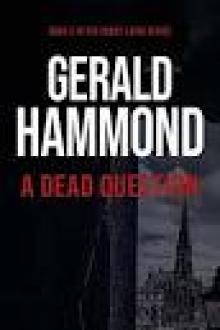 A Dead Question
A Dead Question Twice Bitten
Twice Bitten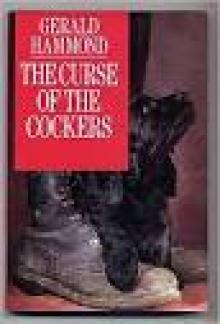 The Curse of the Cockers
The Curse of the Cockers In Loving Memory
In Loving Memory Illegal Tender (Three Oaks Book 12)
Illegal Tender (Three Oaks Book 12) Cold Relations (Honey Laird Book 1)
Cold Relations (Honey Laird Book 1)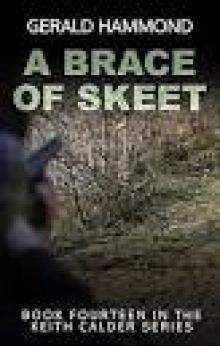 A Brace of Skeet
A Brace of Skeet Silver City Scandal
Silver City Scandal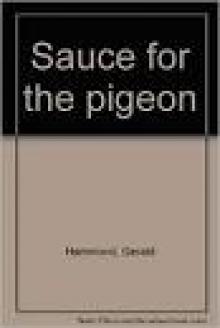 Sauce For the Pigeon
Sauce For the Pigeon Cold Relations
Cold Relations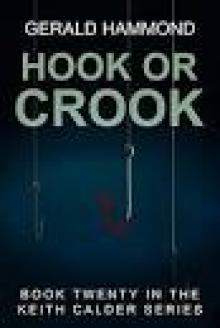 Hook or Crook
Hook or Crook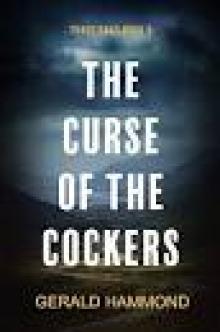 The Curse of the Cockers (Three Oaks Book 5)
The Curse of the Cockers (Three Oaks Book 5) Snatch Crop
Snatch Crop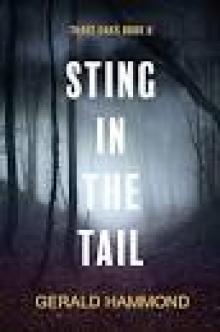 Sting in the Tail (Three Oaks Book 6)
Sting in the Tail (Three Oaks Book 6)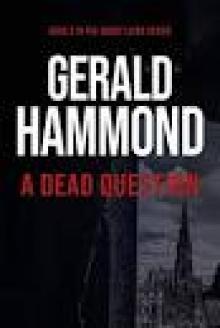 A Dead Question (Honey Laird Book 2)
A Dead Question (Honey Laird Book 2)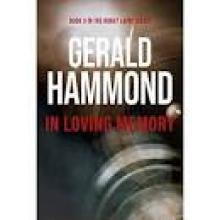 In Loving Memory (Honey Laird Book 3)
In Loving Memory (Honey Laird Book 3) Thin Air
Thin Air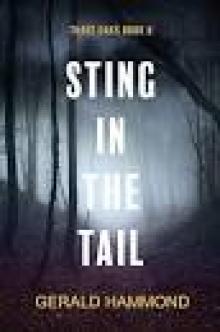 Sting in the Tail
Sting in the Tail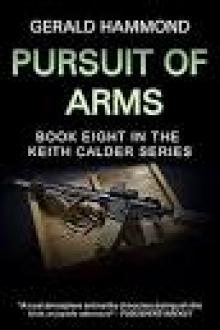 Pursuit of Arms
Pursuit of Arms The Game
The Game Give a Dog a Name (Three Oaks Book 4)
Give a Dog a Name (Three Oaks Book 4) Fair Game
Fair Game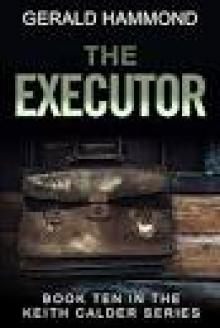 The Executor (Keith Calder Book 10)
The Executor (Keith Calder Book 10) Whose Dog Are You? (Three Oaks Book 2)
Whose Dog Are You? (Three Oaks Book 2) Mad Dogs and Scotsmen (Three Oaks Book 7)
Mad Dogs and Scotsmen (Three Oaks Book 7) Cousin Once Removed
Cousin Once Removed The Worried Widow
The Worried Widow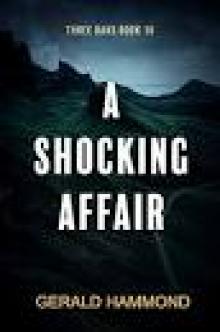 A Shocking Affair
A Shocking Affair Dead Weight (Three Oaks Book 11)
Dead Weight (Three Oaks Book 11) Whose Dog Are You
Whose Dog Are You The Revenge Game
The Revenge Game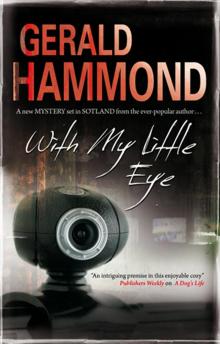 With My Little Eye
With My Little Eye Doghouse (Three Oaks Book 3)
Doghouse (Three Oaks Book 3)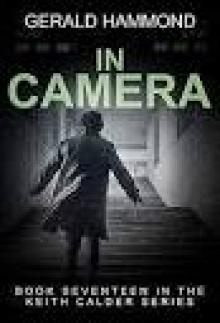 In Camera
In Camera Bloodlines (Three Oaks Book 8)
Bloodlines (Three Oaks Book 8)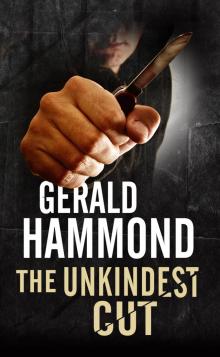 The Unkindest Cut
The Unkindest Cut